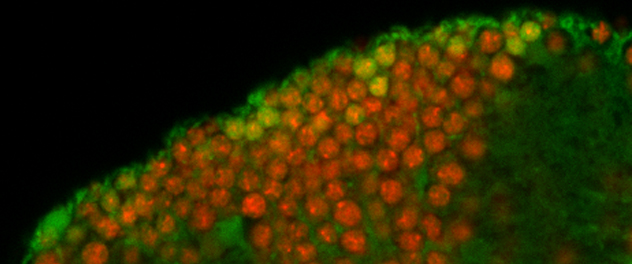-

Restoring damaged nerves
Repairing nerve cells damaged by chemotherapy drugs, spinal cord and peripheral nerve injuries, and amyotrophic lateral sclerosis is the focus of the research in Dr. Windebank's lab.
-

Understanding peripheral neuropathy
The lab grows nerve cells in a dish to understand the mechanisms of chemotherapy-induced neuropathy and screen for drugs that will protect nerves from damage.
-

Therapeutic MSCs
Mesenchymal stromal cells (MSCs) are being used to protect nerve cells and deliver therapies that support nerve regeneration.
-

Flies help unravel human disease
Dr. Windebank's team studies the effects of drugs on fruit fly brains and behavior to help understand the genetic risk factors for chemotherapy-induced peripheral neuropathy.
-
![Spinal nerves [red] grow through scaffolding supported by cells [green] and myelin insulation [blue] after spinal cord injury.](/-/media/kcms/gbs/research/images/2019/02/06/17/42/regen-neurobio-lab-windebank-632x264-10.jpg)
Scaffolds support nerve regrowth
After spinal cord injury, spinal nerves (red) grow through scaffolding supported by cells (green) and myelin insulation (blue).
-

Nervous system repairs
Researchers in the Regenerative Neurobiology Lab are learning how to adopt novel materials to support nerve regeneration and promote recovery after injury.
Overview
The Regenerative Neurobiology Laboratory seeks to understand the cellular mechanisms underlying injury and repair in the nervous system. There are four major disease areas:
The lab studies these conditions using state-of-the-art technology that includes genetic epidemiology, model systems, cell and molecular biology, and multiple forms of imaging.
The laboratory also develops and leads clinical trials using cell-based therapy and tissue engineering approaches to treating neurological disease. This is facilitated by extensive collaborations with the Center for Clinical and Translational Science (CCaTS) and the Center for Regenerative Biotherapeutics.
Dr. Windebank's lab research includes repair and regeneration after peripheral nerve or spinal cord injury, treatment of amyotrophic lateral sclerosis, and the mechanism of neuronal cell death caused by chemotherapeutic agents. His laboratory coordinates the research activities of a multidisciplinary team, with specialists from neuroscience, biochemistry and molecular biology, physiology and biomedical engineering, neurology, neurosurgery, physical medicine and rehabilitation, orthopedics, and Mayo Clinic Comprehensive Cancer Center.
Affiliations
Research groups and programs affiliated with the Regenerative Neurobiology Lab at Mayo Clinic include: